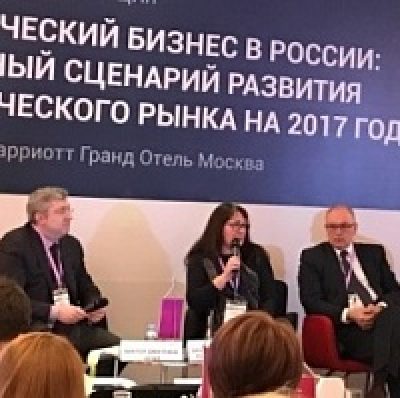PHARMABUSINESS-2017 summit, where pharmaceutical business and regulators get together annually to discuss current issues and future plans, started in Moscow. On the first day of the summit a conference “Pharmaceutical Business in Russia: the Prospective scenario of the pharmaceutical market in the 2017” took place with participating in the Association of the Russian Pharmaceutical Manufacturers.
ARPM Director general, Victor Dmitriev gave a presentation at the session “Law and Business”, which topic was state policy in health care. The topics of the single pharmaceutical market of the Eurasian Economic Union, Russian GMP licensing, preferences for domestic producers, and special investment projects. Also, a separate session was held on labeling of medicines with special markers.
Moderator of the session AIPM Acting Director, Vladimir Shipkov noted that the market demonstrated great viability this year, therefore, it is believed that the market is strong and mature. However, from the perspective of the investment climate, the market is still quite unpredictable. According to Mr. Shipkov, constant changes to regulation is a serious barrier.
Director of the department of development of pharmaceutical and medical products of the Ministry of Industry and Trade, Olga Kolotilova, reassured the audience that the regulator is aware of the current situation and always cooperates with companies. For example, the Ministry initiated corrections to the law which aimed to simplify GMP certification to foreign companies. Now companies could begin registration of new medicines not only with possession of the GMP certificate but also with a document verifying plans for inspection.
Speakers also expressed their concerns about the three-step system of preferences to local producers. Heads of the three professional unions- ARPM, AIPM, and the Union of Professional pharmaceutical organizations noted that the proposed by theMinistry of Industry and Trade mechanic would limit competition on the internal market. “We oppose the ruling in its current form. The measure should act as a penalty to those companies who did not build production of pharmaceutical substances. Instead, it has to stimulate companies to produce those substances,” said Mr. Dmitriev.
Mr.Dmitriev also spoke about the new policy in labeling of medicines which is to become mandatory starting 2018. Companies that are currently participating in the pilot project do so as volunteers. He expressed his hope that by the end of the pilot project certain details, for instance, const and deadlines to implement the technologies, changes to the price for a package. Mr. Dmitriev once again reminded about the risks associated with labeling for the medicines from the lowest price segment. “Profitability of production of these medicines is already very low and sometimes even unprofitable. The additional financial burden could lead to dramatic results for these productions. We see the risk and we a ready to do everything not to have these products diminish from the market.”
Head of the department of the organization of state quality control of medical products of the Roszdravnadzor, Valentina Kosenko encourage companies to participate in the labeling trials. She noted that the project is not a pilot project, per say, rather a priority direction approved by the presidium of the Presidential Council of the Russian Federation. The law on mandatory labeling, according to Mrs. Kosenko will be submitted to the Government in the nearest future. The system will also become a good logistics instrument. Companies will be able to track their products and check on stocks in pharmacies, as well as block retail of substandard products. Also, the labeling system will completely prevent reentering of medicines on the market which would help companies avoid losses. Therefore, companies will benefit from the system.
Director of economics at R-Pharm, Alexandr Bikov agreed with the statement of the Roszdravnadzor. The company is participating in the pilot project. According to Mr. Bikov, the losses from the reentrance of medicines on the market only for one high-priced medicine from the Essential List of Medicines amounted to around 1 billion Rubles a year. However, re-equipment of one production line is 100-150 thousand of Euros.
An argument on cooperation between ARPM and AIPM was signed at the summit. “In various aspects of the industry the two associations have more consensus than disputes, therefore, this act is a logical second step. Our alliance became not only the largest in Russia but also in the Eurasian Economic Union,” said Mr. Dmitirev.

